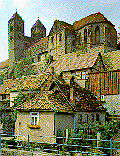UNESCO World Heritage in Germany

Collegiate church St. Servatius
in Quedlinburg
 On the castle-hill, a
steep sandstone-rock, approximately 25m over the roofs of the city Quedlinburg,
rise the towers of the Romance seminary church St. Servatius.
Together with the residential premises of the ladies' convent they form a group
of buildings of great significance and architectural charm.
On the castle-hill, a
steep sandstone-rock, approximately 25m over the roofs of the city Quedlinburg,
rise the towers of the Romance seminary church St. Servatius.
Together with the residential premises of the ladies' convent they form a group
of buildings of great significance and architectural charm.
The Quedlinburger seminary church, which emerged from a residential chapel of King Heinrich I., was used from 936 until 1803 as a place of worship for the secular ladies convent. The Ottonian rulers frequently celebrated Easter at the graves their ancestors. For hundreds of years they frequently read here a requieme for them.
 |
 |
| The Nave from the West | The Nave from the East |
After the death of the patron-elector Georg of Saxony the abbess Anna II of Stolberg introduced the Reformation into the convent. When the seminary was closed by the Reichsdeputationshauptschluss of 1802, castle and church became property of the Prussian state. The last abbess, a Swedish princess, returned to Stockholm.
During the time of the French rule (1808-1813), when Quedlinburg belonged to the Westphalian Kingdom, King Jerome gave the church to the city. In 1812 the magistrate passed the church the castle parishioners.
In 1854 a treaty was signed with the Prussian king. He made a valid guarantee to the parishioners that they could use the church "as their own".
In 1936 the National Socialist Party claimed the King Heinrich I as the founder of the Reich of Thousand Years and the darkest chapter of the church began. On February 6, 1938, the SS forced the then Superintendent Schmidt to hand over the key of the church. The last Mass celebrated on Easter, 1938. After that began the change into a »shrine« of the Nazis. The altar, pulpit, and choir stalls were taken away. The gothic choir was walled up. Only after the end of World War II the cathedral parishioners could finally gather into the chapel.
From May to October and on religious holidays like Christmas and Easter public worship is celebrated each Sunday. The summer concerts and organ music pleases everyone with growing popularity.
Who enters the church today and - impressed by the room of the nave, admiring the achievement of the medieval architecture and stone-masons' work - at the royal graves may feel the exhalation of history, should not forget the reason for this building: it was built to honour God.
The world famous church treasures, some of the most selected and valuable relics from the middle ages, the Servatius reliquary, the Katharine reliquary, the Quedlinburg Itala, the gospel book of Samuhel, the Otto-Adelaide-gospel book, and many others pieces are in their original place again since 1992.
[Deutsche Version]
Last update: 27 May 2006 - If you have any comments or questions, please contact me: